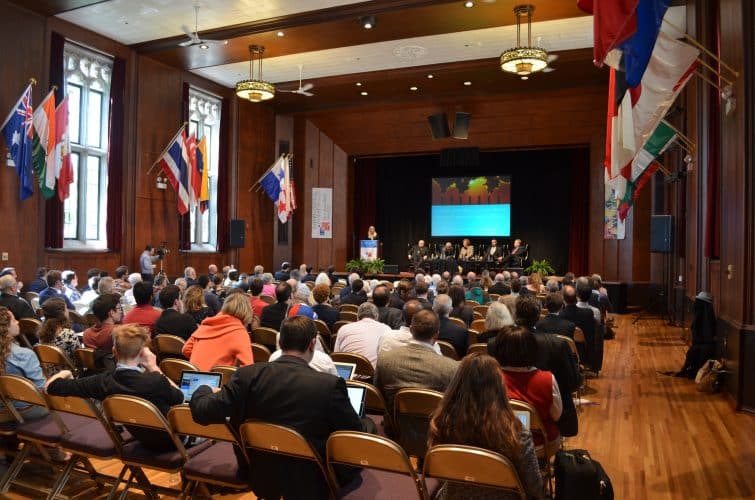Conference Encourages Catholics to Cultivate and Care for the Created World
“Our relationship with the environment can never be isolated from our relationship with others and with God. Otherwise, it would be nothing more than romantic individualism dressed up in ecological garb.” – Pope Francis, Laudato si’
It may come as a surprise—especially given Pope Francis’ current reputation as a pontiff concerned about the environment—that Pope Benedict XVI was considered in both religious and secular circles to be the original “Green Pope.” In boosting efforts to make Vatican City more environmentally efficient, he even purchased a forest to offset the Vatican’s carbon imprint.
Archbishop Thomas G. Wenski (Archdiocese of Miami) reminded the audience of Benedict in order to put Pope Francis’ contribution in perspective in his keynote address in the symposium, “Caring for our Common Home: Economics, Environment, & Catholic Social Thought” (May 19).
Pope Francis’ concerns belong to a tradition of Catholic Social Thought that reaches back to the dawn of the Industrial Age with Pope Leo XIII’s groundbreaking encyclical Rerum novarum (1891). Since then, the Church has repeatedly called for a more just society in which people can strive for holiness in peace and harmony.
In terms of ecology, a concern for the earth and man’s stewardship of it has roots even deeper than modernity. In the Book of Genesis, man was placed in a garden that he was supposed to tend and cultivate. He was “charged with this duty of cultivation for all time,” said Wenski.
How does Pope Francis’ message in his second encyclical Laudato si’ fit into the larger dialogue the Church has on this topic?
The key to understanding Laudato si’ is the term “integral ecology,” explained Wenski. Francis expressed what this means most vividly in the following passage from his encyclical: “If the present ecological crisis is one small sign of the ethical, cultural and spiritual crisis of modernity, we cannot presume to heal our relationship with nature and the environment without healing all fundamental human relationships…Our relationship with the environment can never be isolated from our relationship with others and with God. Otherwise, it would be nothing more than romantic individualism dressed up in ecological garb.”
That, argued Wenski, is where we have to start in our discussions on the environment. In a guest appearance he had on the “Late Show with Stephen Colbert,” he told the comedian, “we gotta get our relationship with God right, our relationship with our fellow man right, if we’re gonna hope to get our relationship with Mother Earth right.”
In other words, “our lack of concern about the degradation of the environment is ultimately a symptom of our sickness of soul,” said Wenski. We can’t repair one relationship in isolation. They are all interconnected.
The disharmony in our souls seeps into everything we do and touch. Because we don’t care about God or one another, neither do we care for the world in which we live. The damage resulting from this rupture resounds through nature. Our negligent souls contribute to pollution, toxic waste, and climate change.
Furthermore, Wenski said that Francis brings to our attention a more serious form of pollution. “Our throwaway culture is not just about McDonald’s wrappers along the side of the highway. It is extended to human beings as well. In Laudato si’—as part of this integral ecology—he zeroes in on how we throw away life in the womb, how we neglect the disabled and show little respect for the lives and the contributions of the elderly. This is a moral pollution as bad as the pollution of rivers and lakes.”
Not only do we casually discard human life in its most vulnerable stages, we treat it as a commodity when it is healthy and strong. Describing human trafficking as a “juggernaut of filth and slavery,” Wenski echoed Francis’ claim that it is fueled by a “pollution of the heart.”
Francis also worries that our ecological challenges weigh heavily on those who can least afford it – the poor. But in assisting the poor and coming to their aid, one culture cannot disregard and disrespect the traditions of another. “The disappearance of a culture can be just as serious, or even more serious, than the disappearance of a species of plant or animal,” Wenski said, quoting Francis.
Given all these challenges that ultimately originate from a crisis in relationship, Pope Francis believes the most important place to start is with dialogue. “Pope Francis uses the word dialogue very frequently,” observed Wenski. It is not a trite word. He takes it very seriously. He wants us to engage with one another, “to be led to an encounter at the heart where significant concepts can be discussed and where real change can occur.”
Wenski praised the Institute for its initiative in organizing the conference. “I think [Pope Francis] would be proud of the dialogue we are having today and the spirit the Lumen Christi Institute brings to these forums on Economics and Catholic Social Thought.” He noted that the Institute provides a rare forum for the discussion of ideas that otherwise get hijacked by right or left. “In our highly politicized reality, our space for these conversations is harder to come by.”
